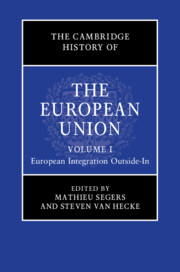Book contents
- The Cambridge History of the European Union
- The Cambridge History of the European Union
- The Cambridge History of the European Union
- Copyright page
- Contents
- Figures
- Contributors to Volume I
- Acknowledgements
- Abbreviations
- Reflections on the History and Historiography of European Integration
- Part I Critical Junctures
- Part II Multilateralism and Geopolitics
- Part III Perspectives and Ideas
- Networks and Attitudes
- 18 Researching the Eurocrats
- 19 Elite Networks of Allegiance
- 20 The Multidimensional Nature of Public EU Attitudes
- Thinking and Memory
- Culture and Religion
- Index
- References
20 - The Multidimensional Nature of Public EU Attitudes
from Networks and Attitudes
Published online by Cambridge University Press: 21 October 2023
- The Cambridge History of the European Union
- The Cambridge History of the European Union
- The Cambridge History of the European Union
- Copyright page
- Contents
- Figures
- Contributors to Volume I
- Acknowledgements
- Abbreviations
- Reflections on the History and Historiography of European Integration
- Part I Critical Junctures
- Part II Multilateralism and Geopolitics
- Part III Perspectives and Ideas
- Networks and Attitudes
- 18 Researching the Eurocrats
- 19 Elite Networks of Allegiance
- 20 The Multidimensional Nature of Public EU Attitudes
- Thinking and Memory
- Culture and Religion
- Index
- References
Summary
It is a truism that not all citizens hold the same opinions when it comes to the European Union (EU), European collaboration, integration, the euro and more. That is rather logical. Why would they? The EU today covers a vast range of policy areas and it seems perfectly legitimate to support some initiatives more than others. Some citizens might be satisfied with how the EU operates, but do not feel that they reap the (economic) benefits, or vice versa.
In general terms, the past decades have seen a significant rise of Euroscepticism across many EU member countries. At the same time, support for pro-EU parties has also increased. This may seem contradictory, but it could also be a hint that EU attitudes can be mixed, ambivalent or multidimensional. We currently do not have a very good overview of how different dimensions of attitudes to the EU have developed over time. Most research was constrained to very limited indicators of public support in most public opinion surveys.
- Type
- Chapter
- Information
- The Cambridge History of the European Union , pp. 516 - 535Publisher: Cambridge University PressPrint publication year: 2023
References
Recommended Reading
- 1
- Cited by

